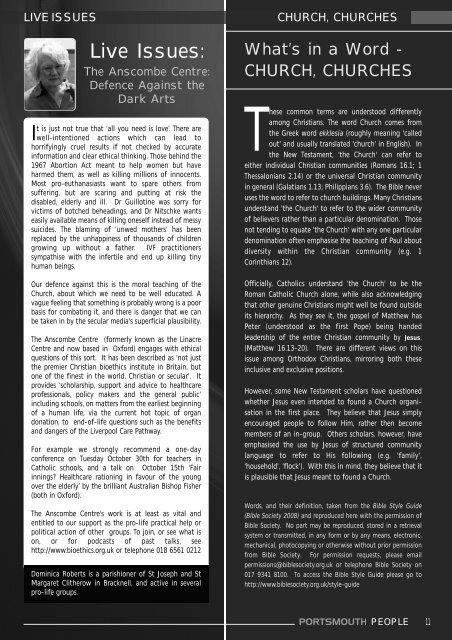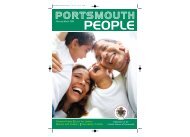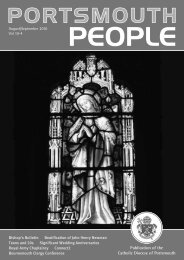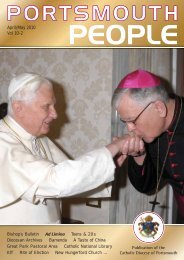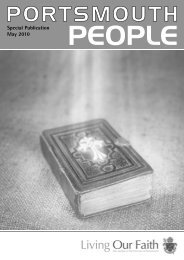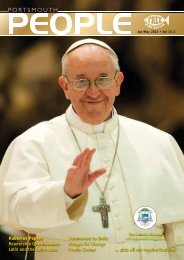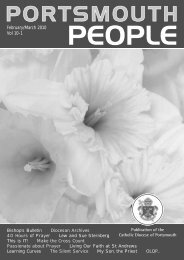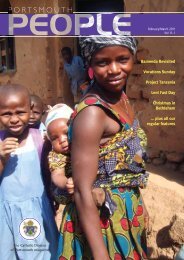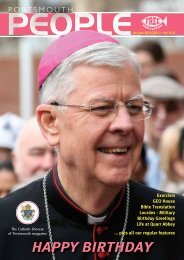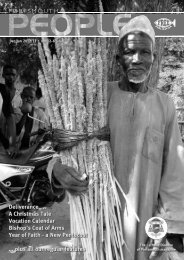Download B&W issue - Portsmouth People
Download B&W issue - Portsmouth People
Download B&W issue - Portsmouth People
Create successful ePaper yourself
Turn your PDF publications into a flip-book with our unique Google optimized e-Paper software.
LIVE ISSUESLive Issues:The Anscombe Centre:Defence Against theDark ArtsIt is just not true that ‘all you need is love’. There arewell-intentioned actions which can lead tohorrifyingly cruel results if not checked by accurateinformation and clear ethical thinking. Those behind the1967 Abortion Act meant to help women but haveharmed them, as well as killing millions of innocents.Most pro-euthanasiasts want to spare others fromsuffering, but are scaring and putting at risk thedisabled, elderly and ill. Dr Guillotine was sorry forvictims of botched beheadings, and Dr Nitschke wantseasily available means of killing oneself instead of messysuicides. The blaming of ‘unwed mothers’ has beenreplaced by the unhappiness of thousands of childrengrowing up without a father. IVF practitionerssympathise with the infertile and end up killing tinyhuman beings.Our defence against this is the moral teaching of theChurch, about which we need to be well educated. Avague feeling that something is probably wrong is a poorbasis for combating it, and there is danger that we canbe taken in by the secular media's superficial plausibility.The Anscombe Centre (formerly known as the LinacreCentre and now based in Oxford) engages with ethicalquestions of this sort. It has been described as 'not justthe premier Christian bioethics institute in Britain, butone of the finest in the world, Christian or secular'. Itprovides ‘scholarship, support and advice to healthcareprofessionals, policy makers and the general public’including schools, on matters from the earliest beginningof a human life, via the current hot topic of organdonation, to end-of-life questions such as the benefitsand dangers of the Liverpool Care Pathway.For example we strongly recommend a one-dayconference on Tuesday October 30th for teachers inCatholic schools, and a talk on October 15th ‘Fairinnings? Healthcare rationing in favour of the youngover the elderly’ by the brilliant Australian Bishop Fisher(both in Oxford).The Anscombe Centre's work is at least as vital andentitled to our support as the pro-life practical help orpolitical action of other groups. To join, or see what ison, or for podcasts of past talks, seehttp://www.bioethics.org.uk or telephone 018 6561 0212Dominica Roberts is a parishioner of St Joseph and StMargaret Clitherow in Bracknell, and active in severalpro-life groups.CHURCH, CHURCHESWhat’s in a Word -CHURCH, CHURCHESThese common terms are understood differentlyamong Christians. The word Church comes fromthe Greek word ekklesia (roughly meaning 'calledout' and usually translated 'church' in English). Inthe New Testament, 'the Church' can refer toeither individual Christian communities (Romans 16.1; 1Thessalonians 2.14) or the universal Christian communityin general (Galatians 1.13; Philippians 3.6). The Bible neveruses the word to refer to church buildings. Many Christiansunderstand 'the Church' to refer to the wider communityof believers rather than a particular denomination. Thosenot tending to equate 'the Church' with any one particulardenomination often emphasise the teaching of Paul aboutdiversity within the Christian community (e.g. 1Corinthians 12).Officially, Catholics understand 'the Church' to be theRoman Catholic Church alone, while also acknowledgingthat other genuine Christians might well be found outsideits hierarchy. As they see it, the gospel of Matthew hasPeter (understood as the first Pope) being handedleadership of the entire Christian community by Jesus.(Matthew 16.13-20). There are different views on this<strong>issue</strong> among Orthodox Christians, mirroring both theseinclusive and exclusive positions.However, some New Testament scholars have questionedwhether Jesus even intended to found a Church organisationin the first place. They believe that Jesus simplyencouraged people to follow Him, rather then becomemembers of an in-group. Others scholars, however, haveemphasised the use by Jesus of structured communitylanguage to refer to His following (e.g. 'family','household', 'flock'). With this in mind, they believe that itis plausible that Jesus meant to found a Church.Words, and their definition, taken from the Bible Style Guide(Bible Society 2008) and reproduced here with the permission ofBible Society. No part may be reproduced, stored in a retrievalsystem or transmitted, in any form or by any means, electronic,mechanical, photocopying or otherwise without prior permissionfrom Bible Society. For permission requests, please emailpermissions@biblesociety.org.uk or telephone Bible Society on017 9341 8100. To access the Bible Style Guide please go tohttp://www.biblesociety.org.uk/style-guidePEOPLE11


